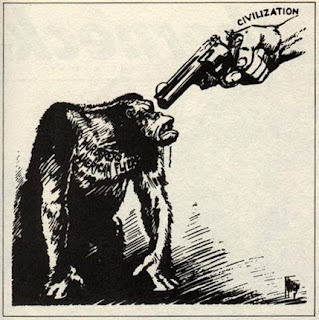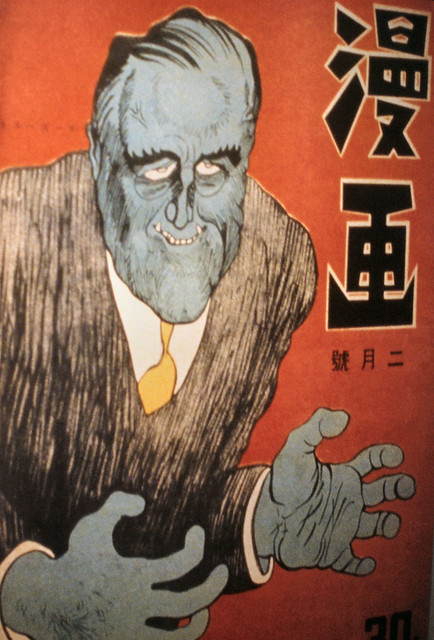… From their perspective that is. I was having a back and forth with a friend about various political/historical junk and it got into the merits or lack of for using the atomic bombs during World War II. I’ve always been under the assumption that they ended the war but he pointed me to a source that doubted that theory. The discussion kinda moved me away from being secure in my assumption but the alternative theory still wasn’t as convincing. In any case, the conversation ended with him talking about how he loves history because it changes and how it would be interesting to look into textbooks from other countries to see how slanted their descriptions of the same events are.
So I recently went to the National WWII Museum in New Orleans, just because it seems like I should at least visit all the tourist sites in the city while living here. I didn’t actually have any particular interest in it but it turned out to be a propos to the conversation I had with my friend.
There was a large section devoted to racist propaganda between the Japanese and Americans. For instance, there was this comic which was from the New York Times:

I’m glad this sort of material was available because reflection on this sort of thing in hindsight seems like one of the most beneficial aspects of such a museum. I’m not personally as interested in what kind of guns were used as I am in what the social climate was at the time. What was a bit frustrating was their attempt to place equal claims of racism on both sides. Certainly, there was racism in Japan at the time but their example of such was the following:

It’s really hard to draw comparisons between the two. The first seems to be promoting extermination of a lower race while the other seems to be saying the people we’re at war with are mean. Should we really be claiming that the Japanese were just as racist as Americans at the time? They did terrible things to prisoners, sure, but we probably did, too. But such actions are not necessarily based on racism so it seems more appropriate to go by what we find in their media to determine the level of racism, which is notably weaker than American racism judging by these images. Let’s not kid ourselves about this; it does no one any good.
Speaking of doing terrible things to prisoners, also absent was any mention of Japanese-American internment camps whatsoever. I don’t know why we have such trouble talking about this subject in the US. We did it, it was terrible, we admitted that when reparations were authorized in the 80s, yet I still don’t remember being taught about this part of our history at all during my high school years in the 90s. And you would think the one place where this could be openly discussed would be a museum dedicated to the war. What better forum could there be for bringing this out in the open? Instead, there was one newspaper clip that gave directions to Japanese-Americans to go to a specific location on a specific date and that was it. The clip didn’t say what they were going there for and never used the word « internment. » There was also no caption explaining what the clip was a reference to. It’s like we’re willing to hint at the idea that we did something bad but no more than that.
This isn’t completely off-topic, however. Part of what I love about learning other languages is that it almost forces you to learn about other cultures and in a more direct way than just reading about them in your native language. For instance, one of my Spanish classes at City College of San Francisco spent one day a week where someone in the class would present a topic involving the country we were learning about at the time. This almost always turned into sort of guilt-ridden sessions about the evils of US activity in other countries but there was good reason for this: there was truth to it. And this was almost always buoyed by my Chilean professor who seemed to have a pretty robust knowledge of the history of all of Latin America. In fact, I really wanted to ask her personally why she came to the US because I later learned about how the US supported the takeover of her government by a pretty brutal dictator.
I never did work up the nerve to ask, but this is something I could only really get an inside perspective on by speaking the language. Likewise, my Spanish professor last semester was Cuban and even spent some time being locked up for his religious beliefs. I really wanted to ask him questions about Cuba but couldn’t work up the nerve either, unfortunately. But even the possibility of having that conversation is very unlikely to occur in monolingual situations. I even enjoy reading Wikipedia articles in both Spanish and English to see what changes from the other perspective. It’s interesting, to say the least.
Now that I’m learning Japanese, it will again be very tempting to ask my professor about her perspective on things like WWII. Maybe this time I’ll actually work up the nerve to take advantage of such an opportunity.
But anyway, for clarification for anyone who didn’t realize it: the US rounded up Japanese-Americans during WWII, especially on the west coast, and sent them to camps that they weren’t allowed to leave. Their property and possessions were often sold, etc. It was a pretty terrible thing and it happened.



Commentaires récents